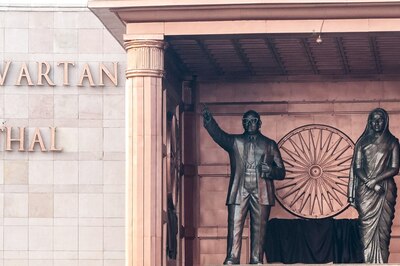
views
The Calcutta High Court recently ruled that depriving a woman of her stridhan or any other economic or financial resources to which she is entitled constitutes domestic violence under the Protection of Women from Domestic Violence (PWDV) Act, 2005.
Justice Subhendu Samanta observed, “The deprivation of petitioner to any economic or financial resources to which the aggrieved person is entitled under any law is also domestic violence. In this case, it is the fact that the petitioner was deprived of her stridhan articles for a long which were under the custody of the opposite parties. This fact is tantamount to Domestic Violence”.
The single-judge bench was hearing a plea by a widow, Nandita Sarkar, seeking monetary relief, including compensation from her in-laws. Nandita filed the plea against the order and judgment of April 17, 2018, passed by the Trial Court, Howrah.
She had sought relief under the PWDV Act before the Magistrate Court, Howrah, wherein the court had awarded her monetary relief, including compensation and other reliefs vide order dated July 31, 2015. However, the same order was quashed by the Sessions Court on April 7, 2018.
THE CASE
Nandita’s husband died on October 29, 2010, and her in-laws held her responsible. The day after her husband died, they forced her to live in her matrimonial home, taking all valuable articles and ornaments with them. She stated that her parents were forced to sign some receipts and blank papers on the same day.
It is further alleged that all her stridhan articles, including household goods ornaments, etc. were in the custody of her in-laws and despite demanding it, they did not return them. Furthermore, she alleged that the in-laws did not even hand over a copy of the death certificate of her husband, despite several requests.
On the other hand, the counsel for the in-laws contended that under the provisions of the PWDV Act, the daughter-in-law is not entitled to any maintenance from her father-in-law. He contended that Section 19 of the Hindu Adoption and Maintenance Act provides that a Hindu widow is entitled to maintenance from her father-in-law, subject to limitations, restrictions, and conditions set out in the Act. He added that a widowed wife has only right over the coparcenaries’ property of her deceased husband.
THE OBSERVATIONS
Taking note of the contention, the court stated that the facts in the case are peculiar in nature, and can have two explanations. First, the widow may have felt very alone in absence of her husband and took cozy shelter at her father’s home. Second, they have existed no good terms with her in-laws; that is the woman was not well at her matrimonial home.
Considering the circumstances, the court said, “I am of a view that the Appellate Court has committed an injustice in not considering the entire petitioner’s case before him. The Learned Appellate Court has also not clearly observed why the observation of the Learned Trial Court is not proper. Considering the same it appears that the finding of the Appellate Court regarding the fact that the petitioner has not proved the Domestic Violence against the opposite parties is not correct”.
The court noted that the woman did not have an independent income and that now she was residing at her father’s home at the mercy of her father.
Furthermore, the court noted, “The day-to-day expenses of her livelihood is not a deniable factor. She is only to lay her hand to her father to meet the daily expenses. Thus the circumstances incurred and loss suffered by the petitioner is itself proved from the facts and circumstances of this case”.
Conclusively, while allowing the present petition, the single-judge bench stated that the argument advanced by the counsel of the in-laws has no merit on that score. “Ultimately, it is the irony of fate, that instead of specific legislative intent, the widow lady is roaming doors of Courts for long 10 years without receiving any monetary relief,” the court observed.
Additionally, the court said, “I am of a view that the impugned order passed by the Learned Appellate Court suffered illegality. It is improper by the Appellate court to hold otherwise to that of the scope of the PWDV Act. Thus, the instant Criminal revision has got merit and it is liable to be allowed.”
Read all the Latest India News here



















Comments
0 comment